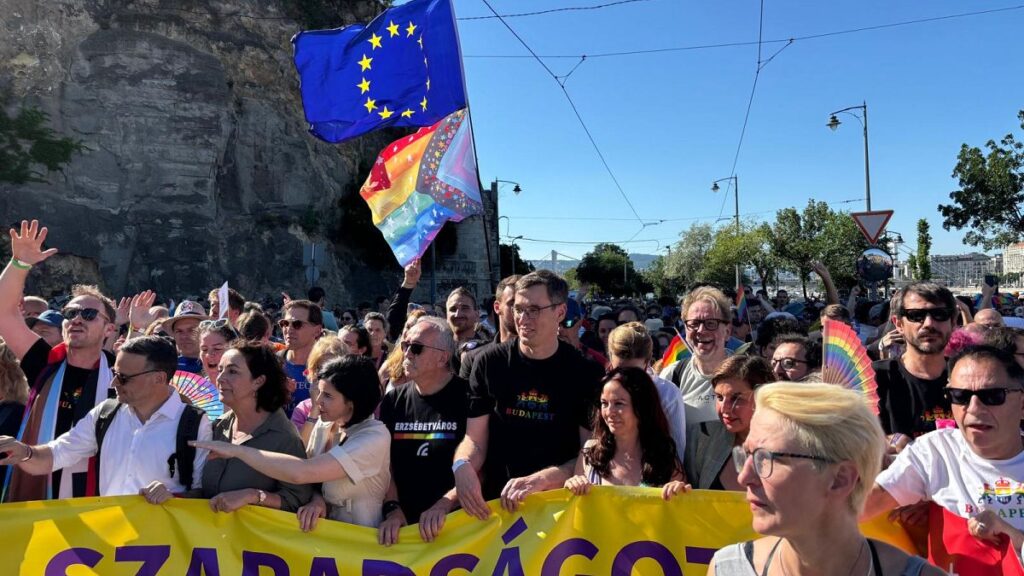Around 70 MEPs from the liberal, green and left wing of the European Parliament joined the Belgian equality commissioner in Budapest on Saturday afternoon, as thousands of protestors marched through the Hungarian capital, waving rainbow and EU flags.
The MEPs were primarily from the liberal Renew Europe, Socialists & Democrats, the Left and Greens groups, joined by one Irish European People’s Party (EPP) MEP, Maria Walsh.
Tens of thousands joined the march, with organisers claiming as many as 200,000 were on the streets.
“Long before I got into politics, and long before I leave, I’ll be showing up for Pride. For me and for my values, Pride is incredibly important. I only wish more were here, but I joined together with over 70 other MEPs from across political parties,” Walsh told Euronews.
“It’s not about one party versus the other party. It’s about one human being showing up for another,” she added, when quizzed on the fact that there was no EPP delegation with her.
“I would have preferred that more EPP people would have joined the event. I think it’s disappointing because this is an important mobilisation,” the President of Renew Europe, Valérie Hayer, told Euronews.
“We have noted, since the start of this term, that the EPP is wavering between the democratic forces and the extreme right. It’s a pity that the EPP doesn’t understand who their adversaries are,” said French socialist MEP Emma Rafowicz.
A notable EPP absence was Hungarian opposition leader and MEP Peter Magyar. His centre-right party Tisza party is currently leading the governing Fidesz party in opinion polls for the 2026 parliamentary election.
Magyar was not in Budapest, avoiding taking a stance of the issue of the thorny issue of the Pride march, which a recent survey indicated divides opinion in the country, with 47% of Hungarians opposed to it taking place.
However, earlier in the day he called for a peaceful protest. “I ask everyone not to fall for any provocation. If anyone gets hurt today in Budapest, if anyone comes to harm, Viktor Orbán alone will be responsible,” Magyar posted to his social platforms.
European Commissioner for equality Hadja Lahbib held meetings with local civil society organisations on Friday. However, she did not show up at the march, telling Euronews that she instead would be attending meetings in the city.
Risking fines and jail time
In March, the Hungarian parliament approved a bill that in effect banned the gay pride march. As the legislation states, this event could violate Hungary’s so-called child protection law, adopted earlier in the country, prohibiting any portrayal of same sex relationships for minors.
The European Commission views this as a violation of its community law and has referred the case to the European Court of Justice.
Conservative and far-right MEPs in the European Parliament defended Orbán’s move to ban Pride events, saying the EU should not interfere in Hungary’s internal affairs.
However, the mayor of Budapest, Gergely Karácsony from the Green party, allowed the parade to go ahead by re-labeling it as a ‘Day of Freedom’ celebration, officially organized by the city council.
This legal loophole allowed the thousands of people to march through the streets of Budapest in sweltering heat, protesting not just the ban Pride ban, but Viktor Orban’s government generally. Alongside pride flags and the loud music, there were banners displaying the prime minister.
“I am not a big fan of Pride events, but this extends beyond Pride. This is about freedom too, because Hungary, a European Union country, banning Pride, is simply not on,” one attendee told Euronews of his motivations for attending.
Security was tight, with security cameras installed on lamp posts in the city centre and hundreds of police officers deployed at key spots of the parade, keeping watch over protesters and ensuring there were no clashes.
Attendees have been warned warned by the Hungarian Ministry of Justice: parade organisers risk up to a year in prison, and fines for attending the march can read up to 500 euros. The police have been encouraged by the government to use facial recognition technology to identify the attendees, although Karácsony insists that nobody will face punishment for their participation in the march.
Anti-LGBT protesters also assembled in Budapest
The nationalist 64 Counties Youth Movement held a legally sanctioned event on the same square in Budapest where Pride participants later gathered. Meanwhile, the Our Homeland Movement, a small far-right parliamentary party, organised a police-approved counter-march along the same route as the municipal Pride event.
However, during the day the far-right protest was blocked by a strong police presence to avoid conflict.
No major incidents were reported by the evening, although Euronews witnessed a confrontation between a small group of the 64 Counties Youth Movement – holding a banner comparing LGBT people to paedophiles and the Pride March.
“We are here because we want to warn the people of Hungary about the LGBT paedophilia, it is a really danger for our children,” one anti-LGBT protester told Euronews.
Another anti-Pride protester tried to stop the march by standing in front of the truck leading the parade. He was jeered by the crowd and removed by the police.
Read the full article here
